
Welcome to newarksnakes.com! I am David, a snake enthusiast living in Newark, NJ. Many people don't know that Newark is in fact full of snakes! You just need to know where to find them - they can often be shy and elusive. Some New Jersey snake species are more common outside of the city limits, in different parts of Essex County NJ, but many types of snakes are indeed common in the more urban parts of Newark. This guide is meant to help educate you about the beautiful snakes of Newark, and to help you identify the most common snakes of Newark, as well as the venomous snakes of Newark that you should learn to recognize and avoid. If you want more detail, click here for my complete list of ALL snake species in Newark. Remember the following:
- Most snakes of Newark are harmless and don't want to encounter you
- Venomous snakes exist but are uncommon in Newark, New Jersey
- Snakes eat rats and mice and are a valuable part of the New Jersey ecosystem
- Never kill a snake - if you leave a snake alone, it will leave you alone.
Common Snake Species in Newark
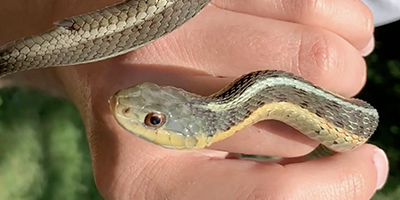 Eastern Garter Snake:
This snake is one of the most common snakes found around residential areas in New Jersey. Though these snakes are more acquainted with a variety of habitats such as fields, water banks, woods, and meadows. Just like every other reptile, they tend to hibernate during the cold winter months, but they are always the first to emerge in New Jersey. You are most likely going to come across them in mid-March.
The adult eastern garter snake's ground color varies from brown to black to olive. Irrespective of the ground color, an eastern garter snake has three different stripes. One on the back of the snake, and the other two at each side extending from the head to the tail region. The stripes on the body of this snake vary from brown, yellow, green to blue.
Eastern Garter Snake:
This snake is one of the most common snakes found around residential areas in New Jersey. Though these snakes are more acquainted with a variety of habitats such as fields, water banks, woods, and meadows. Just like every other reptile, they tend to hibernate during the cold winter months, but they are always the first to emerge in New Jersey. You are most likely going to come across them in mid-March.
The adult eastern garter snake's ground color varies from brown to black to olive. Irrespective of the ground color, an eastern garter snake has three different stripes. One on the back of the snake, and the other two at each side extending from the head to the tail region. The stripes on the body of this snake vary from brown, yellow, green to blue.
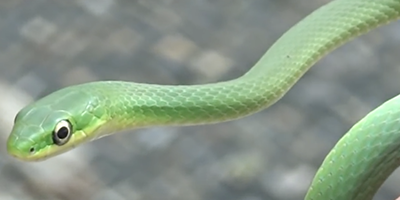 Rough Green Snake:
This Is an arboreal snake with distinctive features that makes it one of the unique snakes that roam around residential areas in New Jersey. These snakes can be found in varieties of habitats, provided there is a tree for it to hide and hang on. The rough green snake shares several similar physical appearances with the common smooth green snake, the only difference is that the scales of the latter are keeled. This tends to give it a rough texture.
Apart from this name, many homeowners in New Jersey refer to it as vine snakes due to the slender nature of its body. Identifying this snake is quite easy. Apart from the keeled scales that give it a rough texture, its body is light green with a white, pale green, or yellow belly. An adult rough green snake can be about 58 inches long.
Rough Green Snake:
This Is an arboreal snake with distinctive features that makes it one of the unique snakes that roam around residential areas in New Jersey. These snakes can be found in varieties of habitats, provided there is a tree for it to hide and hang on. The rough green snake shares several similar physical appearances with the common smooth green snake, the only difference is that the scales of the latter are keeled. This tends to give it a rough texture.
Apart from this name, many homeowners in New Jersey refer to it as vine snakes due to the slender nature of its body. Identifying this snake is quite easy. Apart from the keeled scales that give it a rough texture, its body is light green with a white, pale green, or yellow belly. An adult rough green snake can be about 58 inches long.
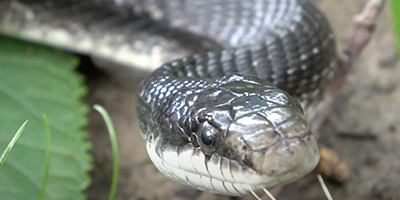 Black Rat Snake:
This particular snake is the largest in New Jersey. Known for moving around rural and semi suburban areas in New Jersey, this snake has a long time record of freaking homeowners out due to its large size. The good news about this snake is that it is non-venomous.
Black rat snakes are slightly bigger than the racer snake. When the skin is distended, it usually appears like the scales of the snake are white. While in some rare cases, they may appear as dark brown with black blotches.
Black Rat Snake:
This particular snake is the largest in New Jersey. Known for moving around rural and semi suburban areas in New Jersey, this snake has a long time record of freaking homeowners out due to its large size. The good news about this snake is that it is non-venomous.
Black rat snakes are slightly bigger than the racer snake. When the skin is distended, it usually appears like the scales of the snake are white. While in some rare cases, they may appear as dark brown with black blotches.
Venomous Snake Species in Newark
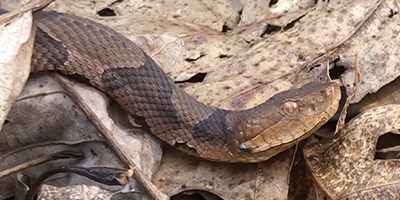 Northern Copperhead:
Unlike the other snakes described above, northern copperheads are not social snakes. It's best to stay as far away as possible from it if you happen to find it in your environment. These are deadly snakes and are very quick at striking any threat within their range of attack and a single bite from it could cause devastating effects to the nervous system of humans.
Being a reptile that relies on camouflage to stay protected, they usually lay motionless on a particular spot waiting for good prey to come their way. These snakes are pinkish to grayish-brown in color with regular reddish-brown to brown crossbands. The head also has an unpatterned background which is either copper, orange, or rusty red. The broad triangular head of the snake alongside the elliptical pupils makes this snake even easier to identify.
Northern Copperhead:
Unlike the other snakes described above, northern copperheads are not social snakes. It's best to stay as far away as possible from it if you happen to find it in your environment. These are deadly snakes and are very quick at striking any threat within their range of attack and a single bite from it could cause devastating effects to the nervous system of humans.
Being a reptile that relies on camouflage to stay protected, they usually lay motionless on a particular spot waiting for good prey to come their way. These snakes are pinkish to grayish-brown in color with regular reddish-brown to brown crossbands. The head also has an unpatterned background which is either copper, orange, or rusty red. The broad triangular head of the snake alongside the elliptical pupils makes this snake even easier to identify.
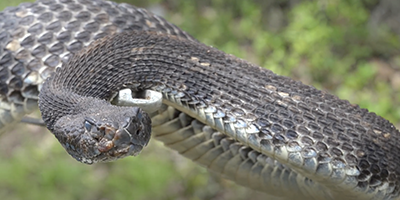 Timber Rattlesnake:
Here is also another heavy-bodied venomous snake that is frequently encountered in Newark New Jersey. The timber rattlesnake usually has a head that is unmarked with either a light gold or yellow color. An adult can grow as long as 35 to 50 inches, depending on how suitable the habitat is and how readily available food is. They are either brown, rusty orange, gray or yellow with dark brown extending crossbands.
Timber Rattlesnake:
Here is also another heavy-bodied venomous snake that is frequently encountered in Newark New Jersey. The timber rattlesnake usually has a head that is unmarked with either a light gold or yellow color. An adult can grow as long as 35 to 50 inches, depending on how suitable the habitat is and how readily available food is. They are either brown, rusty orange, gray or yellow with dark brown extending crossbands.If you're unsure, you can email me a photo of the snake at info@newarksnakes.com and I will email you back with the snake's species. If you found a snake skin, read my Found a Skin? page, and you can email me a photo of the skin, and I'll identify the snake for you. If you need professional Newark snake removal help, click my Get Help page, or see the below website sponsor I found, who provides that service.
Why Do Snakes Come out Mostly at Night?
The snakes that will be active at night usually belong in the family of pit vipers. They are snakes that are armed with the heat-sensing pit in between their eyes and nostrils. It helps them detect heat signatures that come from their prey. Using these sensors will be tricky during the day since many things will be releasing heat due to the warm rays of the sun. Once the sun goes down, most items will cool off, making it easier to detect the heat signatures of their prey.
Where Do Snakes Go At Night?
As aforementioned, the snakes that will be active at night will depend upon their species. Most snakes are not nocturnal or diurnal; they can be active day or night as long as the temperature allows them to do so. Note that there are more than 3,000 snake species worldwide, and not all of them will exhibit the same behavior. Snakes that will be inactive at night will usually be found in their den. Since the night will be cooler, they will instead retreat to their burrow that provides them warmth.
Do Snakes Sleep?
When you look at the snake, they may seem incapable of sleeping since their eyes are always wide open. However, while they cannot close their eyes due to the lack of eyelid, they can still shut off their retina. Snakes, just like any living being, will need to sleep to rejuvenate their energy. According to the researchers, most snakes will sleep at about 16 hours every day. This number may vary depending on their eating schedule and the climate. When the temperature drops, the snakes will sleep an average of 20 hours per day.
Where do Snakes Sleep?
When looking for a place to sleep, they will look for a place that provides safety and security. It should keep them away from harmful elements such as severe weather conditions and the threat of predators. Some of their preferred locations would be the abandoned burrows of other animals. If they find a rodent burrow, they will invade the place, eat the rodents, and live there. Snakes can also bury their body in the ground but only if the sand or soil is loose. Also, they will do this not to sleep but to ambush their prey. They can sleep on the hollowed part of the tree, under the piles of leaves and rocks, and on human-made structures. As long as they can be safe from predators, they can sleep on it.
Snakes are fascinating creatures that are composed of more than 3000 species. Each of them has a way of foraging foods and breeding. Some of them will be active during the day; others will prefer to hunt at night. Still, others may remain active day and night. Just like any other living being, they also need time to sleep. They will be spending a tremendous amount of their time sleeping in their den. In the winter season, their sleeping time can last for 22 hours.
Remember, the term is not poisonous snakes of Newark, it's venomous snakes of Newark. Poison is generally something you eat, and venom is injected into you. That said, dangerous snakes are very rare in Newark. The few venomous snakes of Essex County are rarely seen. But they are commonly misidentified, so learn about all the snake species of Newark in order to correctly identify them. These snakes are usually also found in the surrounding towns of Newark, Montclair, West Orange, Livingston, Bloomfield, East Orange, Nutley, Belleville, Caldwell, Fairfield, Irvington, Cedar Grove, West Caldwell, Maplewood, Millburn, City of Orange, Verona, South Orange, Roseland, Essex Fells, Glen Ridge, North Caldwel and the surrounding areas.
Read our article about:
How Does A Snake Move?
newarksnakes.com domain and hosting costs made possible by the generous support of this sponsor:
